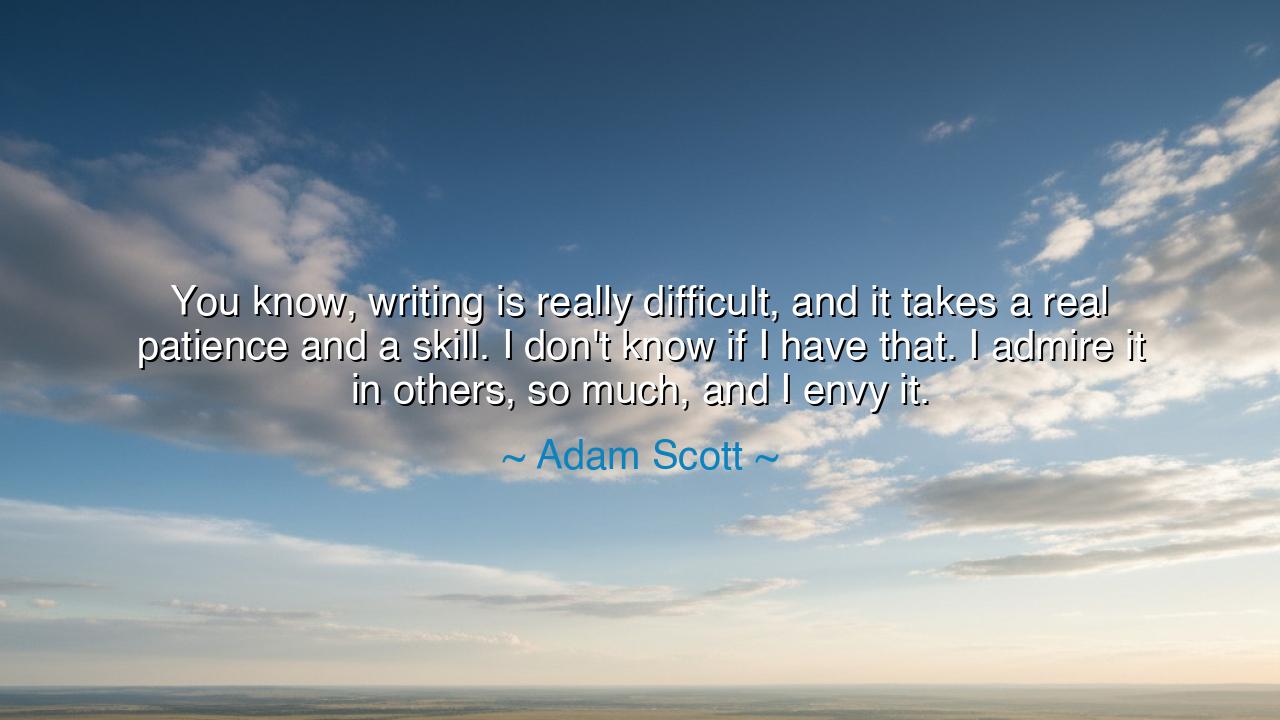
You know, writing is really difficult, and it takes a real
You know, writing is really difficult, and it takes a real patience and a skill. I don't know if I have that. I admire it in others, so much, and I envy it.






Adam Scott, a man known for his performances upon the screen, spoke with humility when he declared: “You know, writing is really difficult, and it takes a real patience and a skill. I don’t know if I have that. I admire it in others, so much, and I envy it.” In these words lies a confession of awe toward the ancient craft of writing, a recognition that to capture thought in words is among the hardest labors of the human spirit. For unlike fleeting speech or passing gesture, writing demands permanence, clarity, and the courage to endure one’s own thoughts carved into form.
The first truth he names is that writing is difficult. This difficulty is not only of grammar or structure, but of soul. To write is to wrestle with silence, to drag meaning from the chaos of the mind and give it shape upon the page. It requires not only inspiration but patience—the ability to sit, to revise, to wait for the right word to emerge from the shadows. Many begin, but few persist. For patience is a rare companion, and without it, the page remains empty.
Scott also names skill as essential to the craft. Skill in writing is not gained in an instant; it is forged as a sword is forged, hammered again and again in the fire of practice. Words must be chosen with care, rhythm must be shaped with attention, and stories must be woven like tapestries. Some are born with the instinct, but even they must hone it with sweat and failure. To admire this skill in others, as Scott does, is to recognize the years of hidden labor behind every book, every poem, every play that endures.
History offers us vivid examples. Consider Homer, whose epics shaped the imagination of an entire civilization. Though perhaps carried first by voice, his tales endured because they were written, preserved through the centuries. Or think of Tolstoy, who spent years crafting War and Peace, revising endlessly until the work bore the weight of eternity. Such authors remind us that writing is not born of ease, but of persistence. Their greatness came not because the task was light, but because they bore its heaviness with discipline.
And yet, in Scott’s confession of envy lies another wisdom: it is natural to admire what one cannot easily do. To envy the writer is to recognize the immense power that writing holds—the power to outlast time, to touch hearts across centuries, to shape minds long after the writer is gone. While the actor performs before the living, the writer performs before both the living and the unborn. The permanence of writing grants it a sacred weight, and those who stand outside the craft can only gaze with reverence at its endurance.
But this recognition should not discourage us. The truth is that every human soul has a story to tell, though not all may polish it into literature. Some may speak their stories aloud, some may live them through deeds, and some may dare to attempt the written page. If one lacks patience, then let them admire those who possess it. If one lacks skill, then let them practice, humbly and persistently. For writing, like any art, welcomes those willing to try, and each attempt brings one closer to mastery.
The lesson, then, is this: do not shrink before the difficulty of writing. Honor it, as Adam Scott does, and let that honor fuel your respect for those who labor with pen and keyboard. But also, if your heart longs to join them, do not let fear or envy hold you back. Begin with small words, with broken phrases, with imperfect sentences. Be patient with yourself, for patience is the very heart of the craft. And know that every writer, even the greatest, once stood where you stand—staring at the blank page, uncertain if they had the skill, but daring to try nonetheless.
Thus, carry this teaching forward: writing is difficult, writing demands patience, writing requires skill. But because it is difficult, it is also precious. Because it requires patience, it shapes character. And because it demands skill, it creates beauty that endures beyond the years of a single life. Admire it, yes; envy it if you must. But above all, honor it—and, if the spirit moves you, take up the pen and add your voice to the chorus of eternity.






AAdministratorAdministrator
Welcome, honored guests. Please leave a comment, we will respond soon